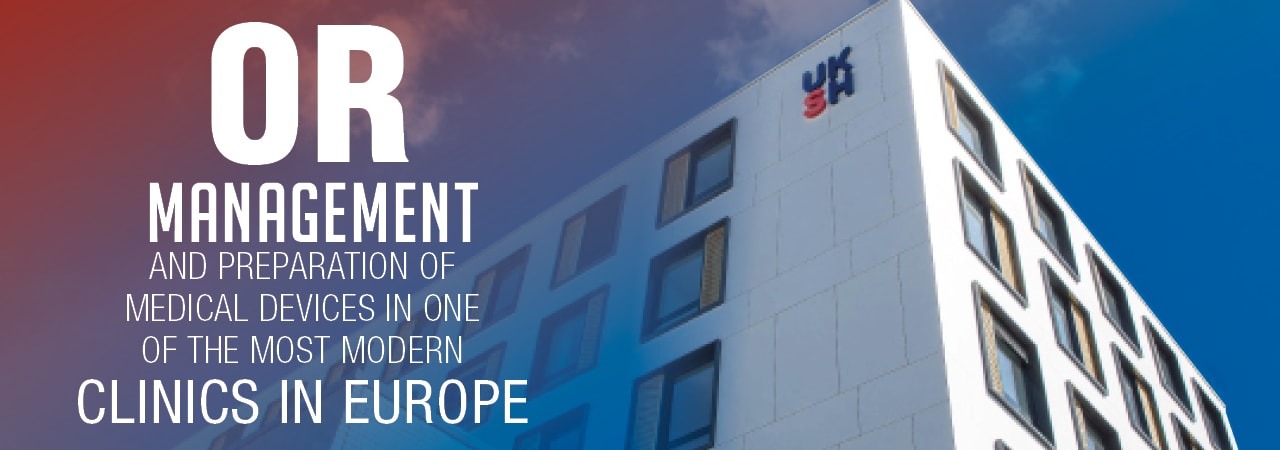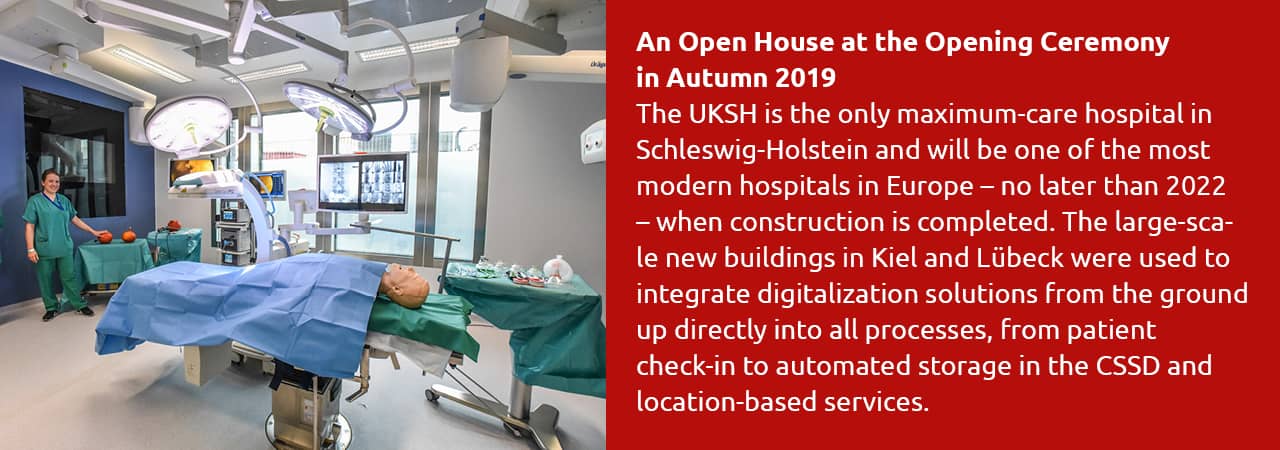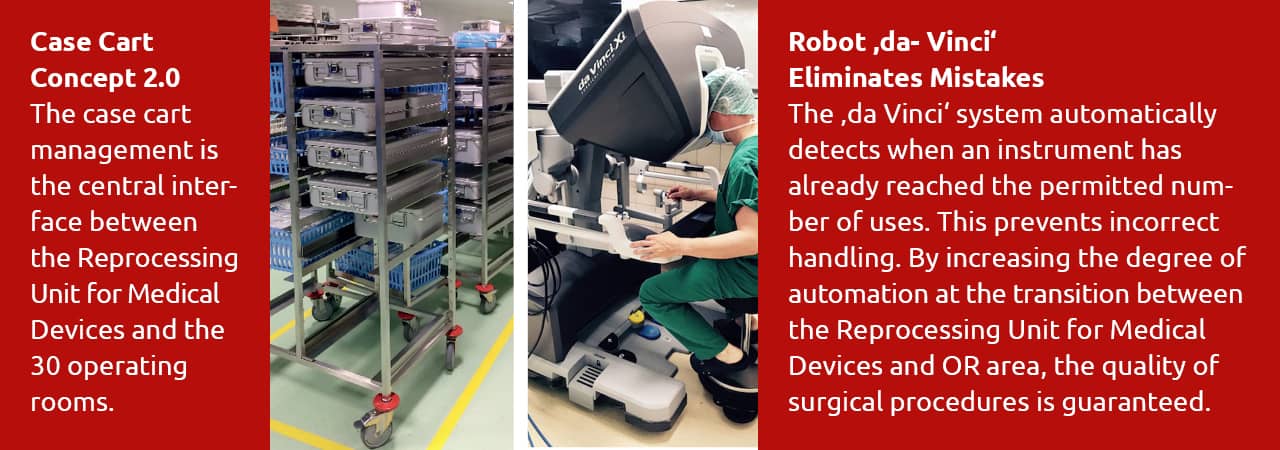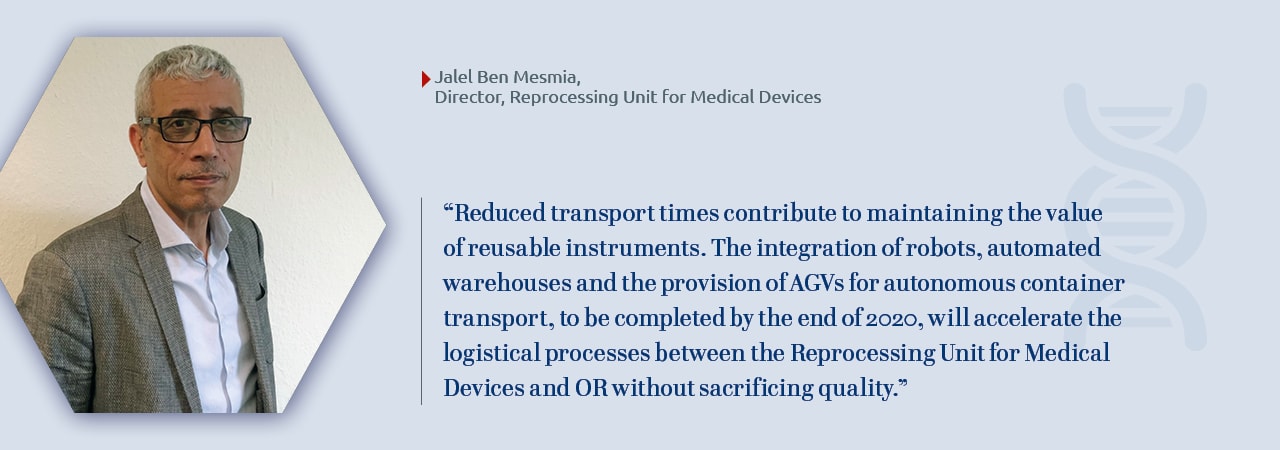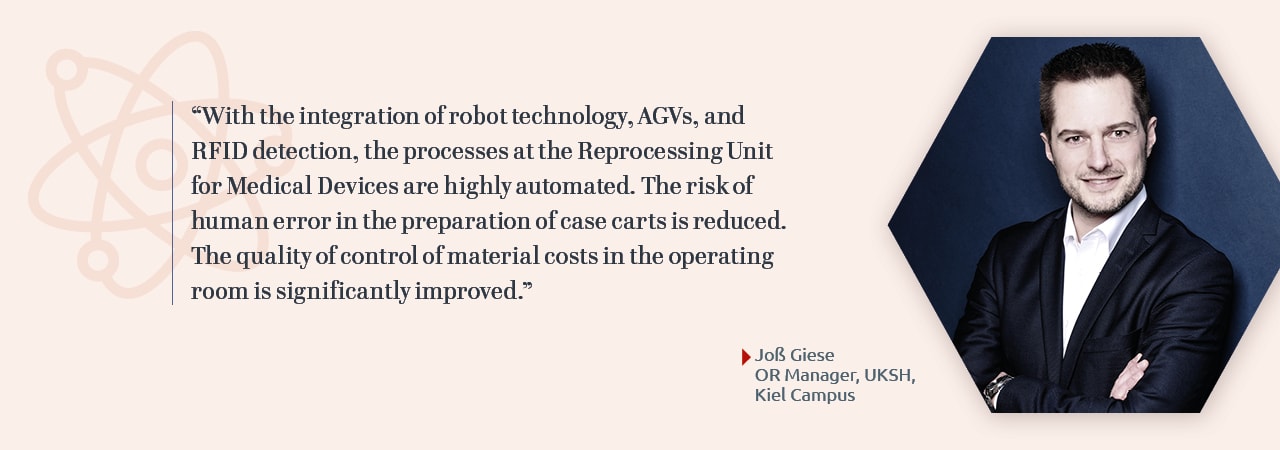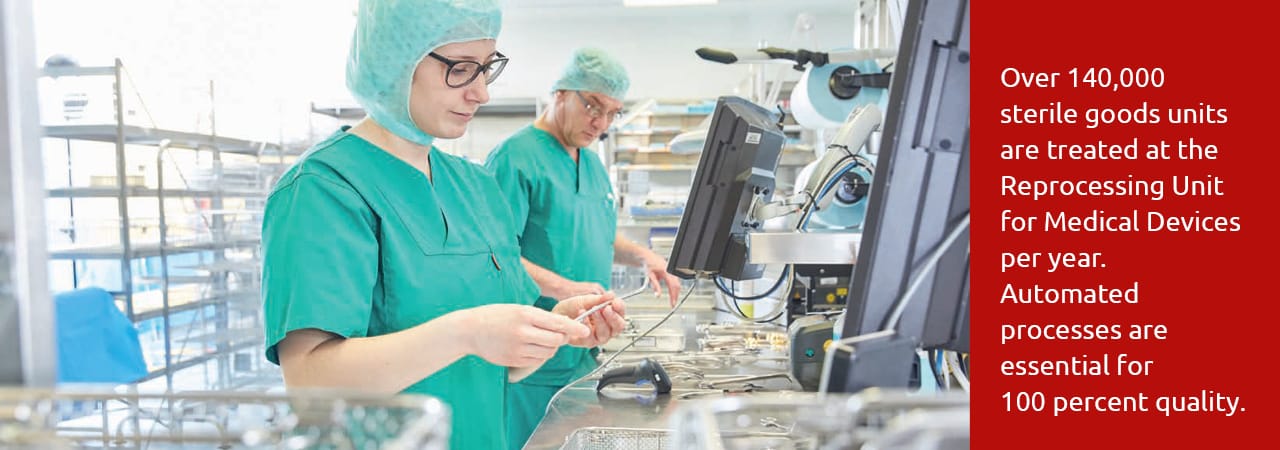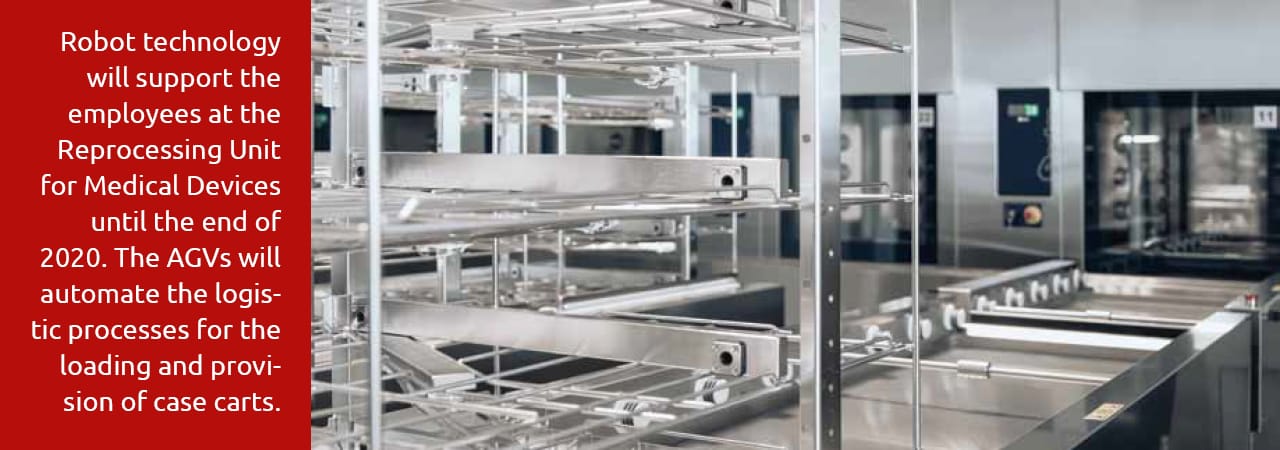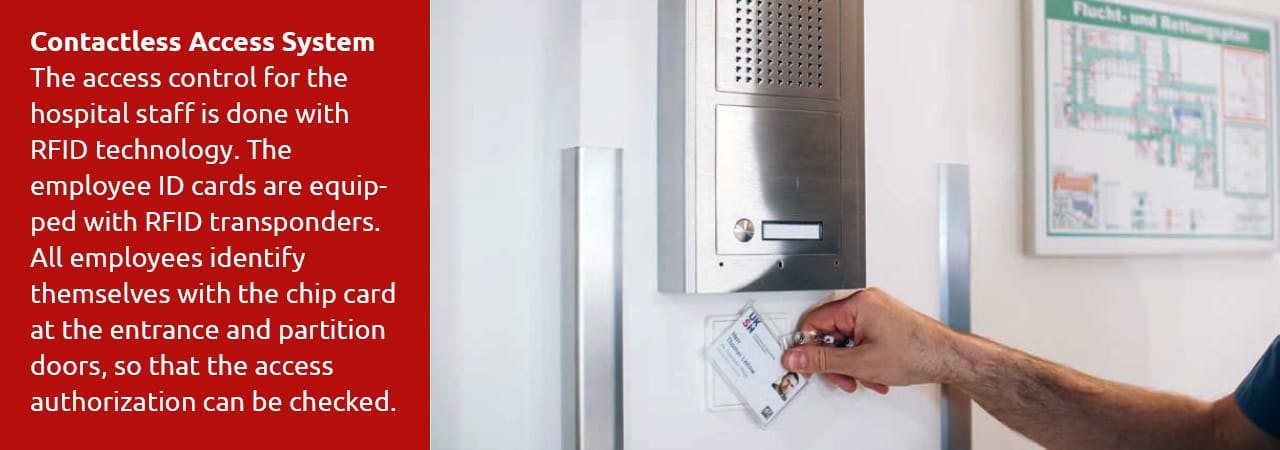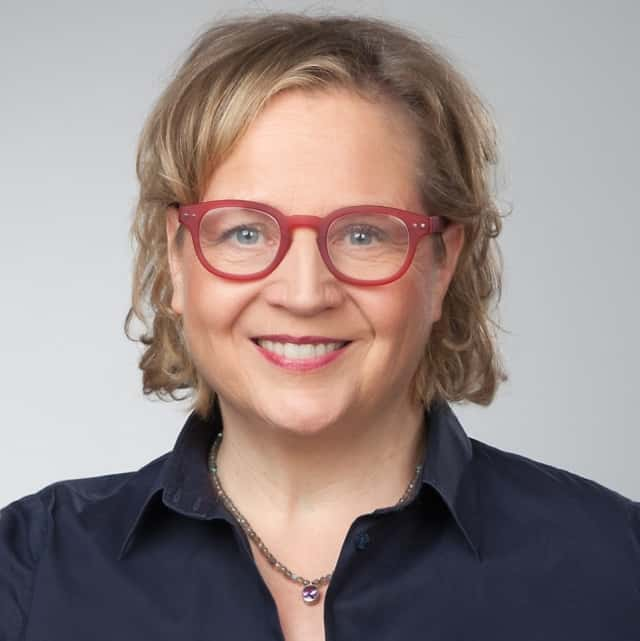Networking + Digitalization = World Class in one of the most modern clinics in Europe
The Kiel hybrid operating theater celebrated a world premiere in 2018. For the first time, an 'Augmented Reality'- based navigation technology for minimally invasive spinal and pelvic surgery was used during an operation.
In autumn 2019, the system, which had been optimized in terms of quality and precision, was used for the first time in a clinical study currently underway. The stateof- the-art system links 3D views, which are recorded by an X-ray system, with virtual images of the patient. Both scans and their respective image information are combined using data technology, so that when viewing the image result, the surgeon gets the impression that he has the patient's spine right in front of him/her.
These special procedures are part of more than 31,500 operations that take place annually at the University Hospital Schleswig-Holstein (UKSH) in Kiel. The coordination of all operations requires the highest performance of OR management. The provision of surgical instruments and consumables from the Reprocessing Unit for Medical Devices will be secured by robots in the future. The innovations in Kiel contribute to making the University Hospital one of the most modern hospitals in Europe.
Joß Giese, OR Manager and Jalel Ben Mesmia, Director of the Reprocessing Unit for Medical Devices at UKSH, Kiel Campus, in an interview with RFID & Wireless IoT Global.
New Medical Facilities on 255,301 sqm in Kiel and Lübeck
Over a construction period of around four years, buildings for medical patient care were constructed simultaneously at two campuses in Kiel and Lübeck, some 80 kilometers apart, on a total of 255,301 square meters. In Kiel, a new building with over 64,000 square meters was constructed, in Lübeck the figure exceeds 55,000 square meters. A total of more than 100,000 square meters of space was converted, renovated or partially refurbished in Kiel. The former uneconomical operation of the pavilion buildings made comprehensive renovation necessary.
The aim of the construction measures was also to centralize certain functional areas. The costs for planning, new construction and renovation amount to around 520 million euros. Additionally, approximately 200 million euros were spent on medical technology, furnishing and IT systems technology.
Cornerstone Laid in 2015, Completion by 2022
One of the most comprehensive clinic construction projects in Europe began with the cornerstone being laid in 2015. The aim of the comprehensive measures is the centralization of 21 clinics on the Kiel Campus and 20 clinics on the Lübeck Campus. Both clinics were commissioned in autumn 2019. The existing buildings on the Kiel Campus will be renovated and converted by 2022.
OR Coordination for 110 Operations Per Day
The UKSH anticipates more than 31,500 operations per year in the outpatient and central operating theaters on the Kiel Campus. A further increase in the number of operations is expected. A look at the operations in the years 2005 to 2018 provides this conclusion. The number of full inpatient operations in Germany increased by almost 40 percent during this period. "In Kiel, around 110 surgical operations are performed daily in 30 operating theaters," sums up Joß Giese, the responsible OR Manager on the Kiel Campus. The operating times vary greatly.
"If a small surgical operation on the eye is completed after less than 30 minutes, a major heart surgery operation can take up to eight hours. OR planning, room occupancy and the provision of instruments and consumables becomes a complex management task due to the necessary flexibility. The organization takes place on several levels. Each department must be given suffi cient time for the planned operations. Emergency capacities must be planned for in parallel."
Case Cart Concept 2.0 under Implementation
In addition to the time component, the provision of sterile medical devices and surgical instruments is crucial for efficient OR organization. The UKSH relies on a case-cart based supply concept.
"Depending on the complexity of an operation, up to five or more case cart units are required. The carts are loaded the day before for planned operations. At the same time, fully equipped and securely sealed case carts are available for emergency operations for immediate use," explains Joß Giese.
In order to cope with the increasing number of ORs without any loss of quality in the provision of case carts, and without exploding costs, the OR management team is working on the Case Cart Concept 2.0. "The reorganization of the complete OR supply and introduction of the case cart system is intended to achieve maximum flexibility while simultaneously optimizing inventory management. We aim to achieve the highest possible standardization of materials and procedures in order to reduce OR material costs and increase the security of supply," says Joß Giese.
Containers, Boxes and Case Carts with RFID Technology
An RFID solution is used to make the provision of the case carts with medical devices more transparent.
"We use RFID technology to track larger units such as boxes, containers or even the carts. The logistics processes are controlled by RFID tracking data," explains Joß Giese. In the expansion stage currently being implemented, robots and AGVs will support the assembly of case carts with instruments and products from the Reprocessing Unit for Medical Devices. RFID communication will then take on an interface role.
Management of 120 Tons of Sterile Goods
In the central sterilization department at the Kiel Campus, all reusable medical products from the more than 30,000 operations performed annually are cleaned, sterilized, packaged and temporarily stored. The logistical cycle between the processing unit for medical devices and the 30 operating theaters will benefi t signifi cantly from the modern automation processes.
From the point of view of Jalel Ben Mesmia, Director of the Reprocessing Unit for Medical Devices, a crucial aspect for the optimization of the sterilization processes is the time savings in the transport of used instruments between the OR and the Reprocessing Unit for Medical Devices.
The central operating theater with 17 rooms, which was created in the course of the new construction, is only two floors above the Reprocessing Unit for Medical Devices. A sterile goods elevator provides a direct link between the two functional areas.
"The reduced transport time contributes to maintaining the value of reusable instruments. Contamination with proteins or chlorides corrodes the surface. The faster the cleaning process can be started, the more often the instruments can be reused."
+6,000 Different Devices Used in Operating Theaters
The diversity of the medical products used poses logistical and procedural challenges for the approximately 50 employees at the Reprocessing Unit for Medical Devices. The different product groups require specific processing methods. More than 6,000 different devices and instruments are used during operations at the UKSH. From 'mass-produced instruments' such as scissors, forceps and scalpels to highly complex working materials such as the accessories for the 'da Vinci' surgical systems.
The instruments for the minimally invasive robotic procedures may only be reused 10 times in total. The 'da Vinci' system automatically detects when an instrument has already reached the permitted number of uses. This prevents incorrect handling. "By increasing the degree of automation at the transition between the Reprocessing Unit for Medical Devices and the OR area, advantages for quality and operating costs are to be achieved", says Jalel Ben Mesmia looking ahead.
Robot Technology to be Operational by the End of 2020
The technology used to automate the case cart management consists of robots, automated warehouses and AGVs. "The planned automation solution will be only the second installation of its kind in the world," reports Joß Giese.
"The robot-supported processes will make it possible to provide case carts with precisely defined sets of instruments punctually for each operation. Thanks to the automation, commissioning can already take place the night before the operation. This will signifi cantly increase supply reliability. If a surgeon needs additional materials, these can be added with a click," says the OR Manager, underlining the gain in flexibility and exact planning.


